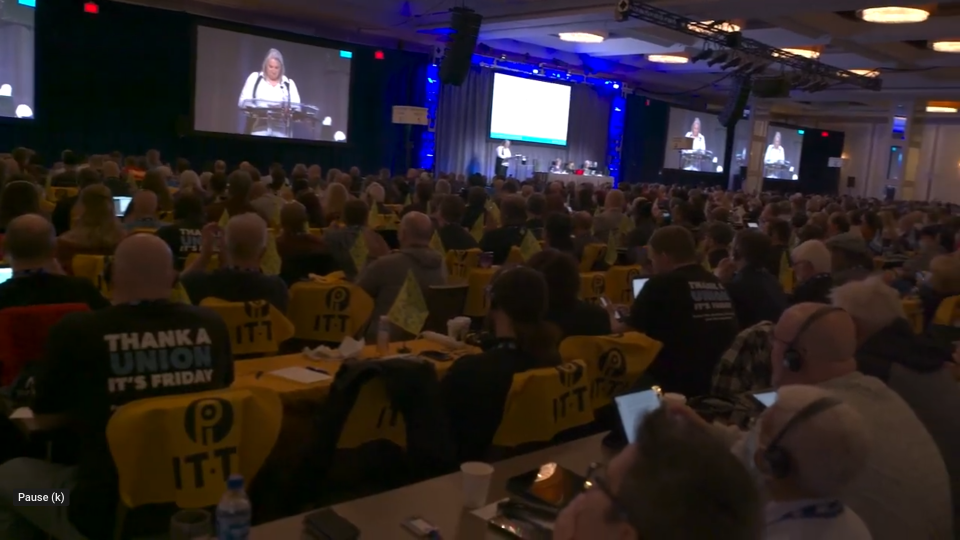My First Union Event
Published on 2022-11-22 by Stuart SpenceThe views expressed here are my own, and do not express the views of my employer or my union.
Here's my experience attending my union's annual general meeting. I felt some empowerment but mostly outrage and boredom.
Clearly my union is sclerotic and archaic. We gathered to vote and share information but both activities were crippled by design.
I respect what unions have done for workers' rights in the past, but clearly this one is also a vessel for retired members to exploit young professionals.
As usual, instead of just complaining I'm also going to propose solutions.

Context
I was invited to be a voting delegate at the 2022 annual general meeting (AGM) in Montreal, Friday and Saturday, to represent the information technology (IT) group in the PIPSC union. PIPSC represents about 60,000 public servant professionals. By law, public servants like myself must pay union dues (whatever the union sets them to). I didn't know a lot about union activities before the event, and part of my application to attend went something like this:
I'd like to go to the AGM to learn about the union. I live in Montreal so I'll be a cheap attendee - no flight or hotel.
It worked. In July I was accepted to attend the November 2022 AGM.
Beavers & Moose

The instant we first had all 700 delegates in a room we all stood for "O Canada" like I was back in high school. I found myself faced with four gigantic projector screens playing epic videos of beavers, moose, Canadian flags, and other wildlife. I wanted to take a video but wasn't sure about etiquette. I settled for a chuckle instead.
Political
I enjoyed hearing "comrade" but there were also attacks on the Ontario conservatives and federal conservatives. I'm no conservative but I don't think the union leadership should be trashing parties that 10-40% of its members likely vote for. Just because you're forced to pay the PIPSC union dues by law doesn't mean you want bigger government and stronger unions.
During a question period a member asked the president about an announcerment she sent during the 2022 convoy protests: PIPSC condemns occupation of downtown Ottawa by convoy. I thought it was a good question, but the member got booed. He was concerned about disinformation. The PIPSC statement said:
PIPSC deplores the images of swastikas, confederate flags, and other symbols of hate
I spent an hour walking around downtown Ottawa two weeks into the convoy protests to see it first-hand. I saw just one "fuck Trudeau" sign and that was it. In the convoy center, mostly people were just hanging out and making noise. The convoy was certainly a hugely disruptive protest that broke many laws, but I don't want the PIPSC president to feel like she can write her own political opinions as if she is speaking for PIPSC members. Not without running a poll.
How many PIPSC members supported (or don't oppose) the convoy? What about Canadians? It's a lot more than nothing: 46% of Canadians sympathize with trucker convoy, but many disagree with their tactics: poll
Emotional
This surprised me. There were dozens of awards given out where the president, recipients, and others were very emotional and sometimes crying. There were standing ovations, hugs, and tears of joy for people I had never heard of. Rarely did anyone explain what these people even literally did. I felt lost and couldn't connect whatsoever.
Voting
During the ten or so hours of motions and voting, here's my best guess on a breakdown of time spent:
- 92% dead time. Waiting for people, procedural gibberish, or tech. You could time travel into the future and not even notice.
- 7% interesting. New information is being presented visually or verbally.
- 1% empowerment. Members are deciding on something or submitting a vote.
I was just 5 years old when Peter Mansbridge first reported about the internet in 1993. The pace of these proceedings is a literal joke to me and everyone under 40. We were sucking information and votes through a straw.
I understand that PIPSC is under legal obligations to have certain procedures. But changes are possible when there's a will. Instead, it's clear to me what's really happening. The procedures stay in place because they:
- silence union members, but make them feel like they have a voice
- stop too many union members from voting too often, but make them feel like they get to vote
The voting and information sharing is crippled:
- We must vote within a 30 second window.
- We must be physically present to vote or speak.
- We must speak and vote synchronously and sequentially.
- We must all listen to a random speaker instead of the best speaker.
None of this is necessary whatsoever.
Decidim
Open source platforms like Decidim solve these problems and more.
- Secure votes by members could be held at any time virtually. Voting can be open for any period of time.
- Comments and ammendments can be submitted any time. Members can vote on either at any time.
- See the most popular "for" and "against" comments for any motion or ammendment.
Here's how to phase in Decidim to PIPSC:
- Deploy a secure platform, give every member login credentials.
- Share all AGM motions on the platform weeks in advance.
- Find top comments according to members voting on those comments. At the AGM, someone reads aloud the top two "for" comments and top two "against" comments from the platform.
The first few years, Decidim votes and comments can have no legal weight. But even that start would be a tremendous improvement.
Leadership Fund
One of the motions we voted on was to double a flexible fund that union leadership can spend without asking for member approval. They wanted $1M instead of just $500k. Their justification for this is that calling members to an AGM is expensive, and not always possible in a timely fashion. For example, a big strike.
This solution is backwards. If it's difficult to collect votes from your members, that's the problem. Fix it. Use Decidim.
Don't use a crippled voting system as an excuse to write yourself a blank cheque.
Addition versus Subtraction
I couldn't help but notice that nearly all rules were adding something. Double the funding, new project funding, more people on this committee, more people guaranteed a spot, more rules. If motions are additive and never subtractive, then even a small number of approvals means the union accumulates bloat and waste over time.
Generally, when in doubt my voting strategy was this: fewer rules, less spending, smaller committees.
Empowerment
Twice I felt I made a difference.
1) One Vote
There were hundreds of voters. I once voted "no" and "no" had just one more vote than "yes". Hah!
2) Metrics
I went up to a microphone to speak in favor of a motion. Union members were concerned about the timeliness of the union communications team. They wanted to get metrics for response rates. Members against the motion were worried that this would give communications people more work, and so we'd get even slower communications. I explained that if non-technical administrative staff are collecting metrics, you're doing metrics wrong. It's an IT and software problem. A few people in the crowd cheered to agree with me. That motion narrowly passed.
Retirees Can Vote, What?
I learned at the AGM that retired members can still attend the AGM and vote. This is outrageous. They don't pay union dues (or rather, just 8%). They don't work and therefore have no personal stake in the union.
What kinds of things do retirees support? Well.
The legacy foundation is a scholarship program provided by PIPSC to the "next generation of professionals". My 32 year-old wife just started studying for a career change in civil engineering. Does my wife qualify? Nope. It's only for children and grandchildren. Who has kids and grandkids old enough to be in university? Retirees and older members. I'm no accountant but it seems likely the union is funding this at least partly with union dues. So the 22 year-old junior we just hired is legally required to pay union dues so baby-boomers can give scholarships to their children and grandchildren. Good to note: scholarships typically help rich kids.
This is theft. I'll be re-introducing motion B-35 as soon as I can, to kick out retired voters. Unfortunately this may require a 2/3 vote as a special resolution because it restricts the rights of voters. Guess what? B-35 died in 2017 because there wasn't enough time to get to a vote, because of the dinosaur voting procedures. I fear it won't pass anyway because retirees will need to vote that they cannot vote.
Training for $1.3M
Even more infuriating than retirees voting was the approval of a $1.3M training event. This huge budget item was slipped into the final budget by top leadership without debate, even though regular members had to debate and vote for some items as small as $50,000.
This training could extend the next AGM from two days to four. Young members and parents of young kids already have trouble attending longer events. Attendance is required for voting rights. You know who can easily attend longer events? Retired members. There was an amendment removing this $1.3M, but it didn't pass, so the $1.3M was approved.
Yes, retired members voted in favour of extending their hotel vacation with their career friends by two days, paid for mostly by oblivious younger working professionals.
During the amendment discussion, the president complained that she has to fly all around the country to provide training to groups of just twenty people. She described this as inefficient. Yet putting seven hundred people in a hotel for two extra days and covering their salaries is the proposed solution. Yikes.
Sneaking around a vote was dishonest, and the training idea is stupid. The president and the union need to decentralize their training, embrace and empower young union stewards, and make virtual training materials that don't suck. The president is right though: flying around the country for small training sessions is a bad idea.
Conclusion
I had an okay experience and learned a lot. The people running the union seem to care about union members and unionization, and they think they're doing good work. So while there is waste and inefficiency, there's also potential for improvements in the future.
I wonder whether me sharing my thoughts here is going to be a problem if I apply next year.
See Also
- This hyped up video montage of the event.
- My four ideas for PIPSC written a few years ago.
